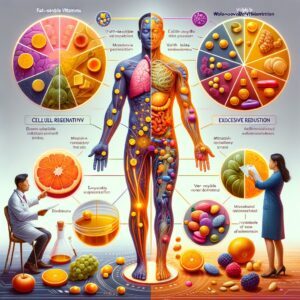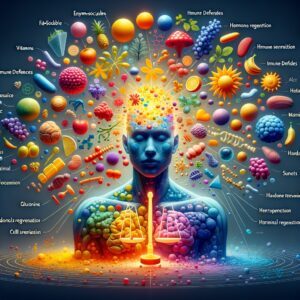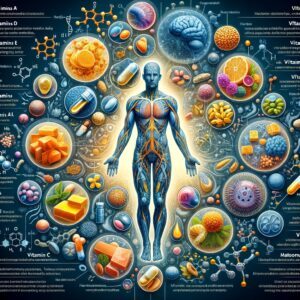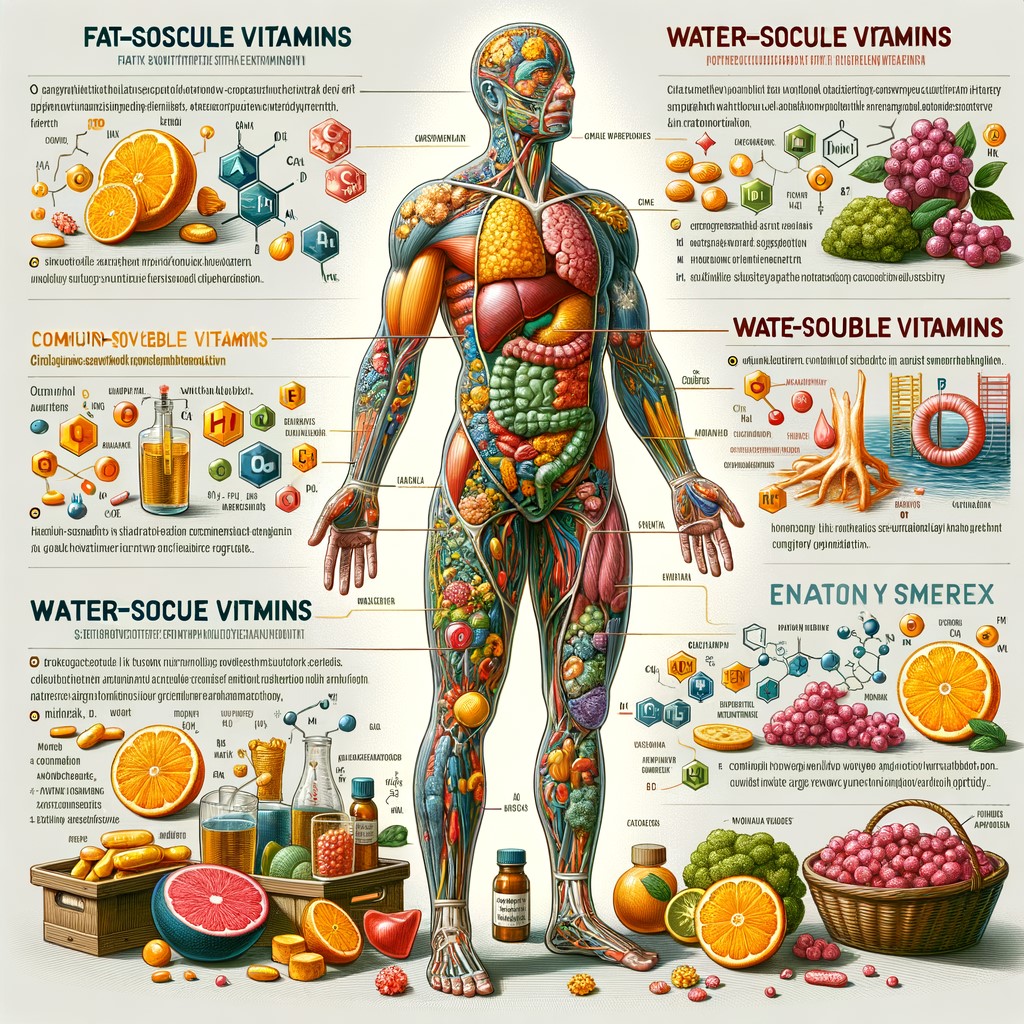In today’s in-depth look at vitamins, we talk about their essential roles, how they work together, and the innovative ways they help keep us healthy. This book begins by explaining the various types of vitamins and their functions in the body, ranging from energy production and immune system modulation to cell repair and promoting healthy aging.
It also provides tips on finding the perfect balance between obtaining vitamins from food and taking supplements. It helps readers comprehend the subtleties of dosage, timing, and synergistic combinations, providing a strong foundation for making informed food choices.

Feel the Difference of Tailored Wellness—Get Started Now.
1. Understanding Vitamins: What Nutrients Are and Why They Are Important
Vitamins are organic compounds that are essential for maintaining the body’s proper functioning. Vitamins are usually grouped into fat-soluble groups (like vitamins A, D, E, and K) and water-soluble groups (such as vitamin C and the B-complex). Each vitamin has its crucial biological role that’s essential for maintaining good health.
They help enzymes function, boost the immune system, and aid in the production of hormones and neurotransmitters. This careful coordination of biochemical processes demonstrates the vital role vitamins play as essential nutrients in the diet.
Rigorous scientific research has demonstrated how these micronutrients influence cell growth, energy production, and metabolic control. For example, vitamin D controls how much calcium the body absorbs, which helps keep bones strong.
Vitamin C, on the other hand, is essential for making collagen and fighting free radicals. Not only do B vitamins help you get energy from meals, but they also protect the health of your nervous system. Nutrition experts emphasize that obtaining sufficient vitamins can reduce the risk of chronic diseases, enhance the body’s ability to heal itself, and improve cognitive function.
Also, it’s essential to have a balanced diet because not getting enough of some nutrients or getting too much of others might be bad for your health. Comprehensive nutrition planning encourages people to eat entire meals that are naturally high in vitamins. This is because different nutrients work better together in whole foods.
As new research continues to reveal the various ways that vitamins act, it supports the idea that vitamins are not separate entities but essential parts of a larger nutritional network. Learning about vitamins in a precise and organized manner provides both individuals and healthcare professionals with the information they need to make informed dietary choices that will promote their well-being and happiness for a long time.
For individuals seeking optimal health outcomes, it remains crucial to monitor their vitamin intake through regular nutritional assessments closely. Expert advice helps customize vitamin methods to fit different metabolic profiles and lifestyle needs. We learn more about vitamins through ongoing study and collaboration with professionals. This makes sure that science-based advice leads to effective supplementation.

Strengthen Mind, Body, and Purpose with Every Dose.
2. What Happens to Your Body When You Start Taking Vitamins
When vitamins are added to a healthy diet, the body starts to show changes that may be measured at different levels of physiology. At first, these essential nutrients boost enzyme activity by turning on cofactors that are necessary for metabolic events.
For instance, many B-complex vitamins help the body produce energy by breaking down carbohydrates, lipids, and proteins. Over time, a system that gets enough nutrients can adapt by having more energy and better brain function.
At the same time, vitamins C and D help the immune system work better by controlling inflammatory responses. This change can help you recover more quickly from common illnesses and maintain overall health. Cells take in vitamins from the blood to assist in development and repair. Vitamins like E have antioxidant capabilities that help protect cells by lowering oxidative stress and the risk of tissue damage.
Vitamins also affect how hormones work and how cells talk to each other. For example, vitamin D receptors in different organs turn on genes that affect not only bone health but also how the immune system works. When deficiencies have made the metabolism or immune system less effective, starting to take supplements can help restore balance and improve biochemical pathways.
It’s crucial to remember that these reactions vary from person to person, depending on their metabolism, current nutrient levels, and overall health. For some people, the changes may occur slowly, while for others, they may notice a significant difference in energy and physical performance within just a few weeks.
In short, starting a vitamin supplement routine sets off a chain of events that help keep the body’s systems in balance, make sure that energy is used efficiently, and strengthen the body’s defenses at the cellular level.
These modifications often begin small and gradually lead to significant health benefits. Keeping an eye on how your body reacts to vitamins can help you determine if you’re getting enough nutrients and make adjustments to your diet, allowing you to take a more tailored approach to your health. As a result, these benefits last for a long time.

Achieve Your Wellness Goals with Expert-Backed Nutrition.
3. Dosage Dynamics: How to Deal with the Pros and Cons of Different Levels of Intake
To figure out the right amount of vitamins to take, you need to think about both the good and bad things that could happen. There’s a lot of evidence that vitamins are good for you. Taking the right amount of them helps your immune system, repairs cells, and keeps your metabolism healthy.
But taking too many vitamins, especially fat-soluble ones like A, D, E, and K, might be harmful. When you eat too much water-soluble vitamins like C and B-complex, your body usually gets rid of them. However, imbalances can still cause problems.
To understand how dose works, you first need to consider each person’s nutritional needs. Age, weight, lifestyle, and any health problems you already have are all important factors in figuring out the best amount to take. Health authorities provide evidence-based suggestions that are useful to consider; however, each person’s needs are unique, so adjustments may be necessary that go beyond what’s typically recommended. Consulting with nutrition experts ensures that supplement plans align with personal health goals and reduce the risk of complications.
Additionally, it’s essential to understand how food sources and supplementary vitamins interact. When a balanced diet provides sufficient amounts of a nutrient, taking extra supplements may not be beneficial and may even increase the likelihood of nutrient imbalances.
If someone is lacking in any area, taking the right amount of supplements can help restore balance with minimal risk. Understanding how these dosages interact will help you make informed choices about your supplement regimen and is essential to avoid the problems that can arise from taking too much or too little.
Ultimately, taking vitamins in a planned and informed manner leads to improved health outcomes, underscoring the importance of personalized nutrition plans. It’s essential to carefully regulate vitamin dosages because even slight deviations from the recommended amounts can disrupt the body’s homeostasis.
Regular monitoring and occasional adjustments based on blood tests and professional evaluations provide individuals with the necessary tools to maintain optimal nutrient levels. This ensures that supplementation remains a beneficial aspect of an overall health plan, rather than a cause of harm. Making informed choices leads to the best health.
4. Aging Gracefully: Important Vitamins for a Long Life and Healthy Aging
Studies show that getting the right amount of vitamins is essential for staying healthy as you get older and living longer. A healthy diet full of essential vitamins not only helps the immune system, metabolism, and brain function, but it also slows down the natural decline that comes with aging.
For example, vitamin D plays a crucial role in maintaining strong bones and healthy muscles. Vitamins C and E are also essential, as they are potent antioxidants that protect cells from oxidative stress and may lower the risk of developing chronic diseases.
As we get older, our bodies become less able to make and absorb some nutrients. This means that we need to pay more attention to foods that are good for our bodies and minds. B-complex vitamins are essential because they help the body make energy and keep the neurological system healthy, which helps keep your mind sharp and your mood stable. Vitamin K is another essential nutrient that is particularly important for older individuals, as it helps regulate calcium levels and maintain heart health.
These vitamins should be part of a comprehensive nutrition plan that includes lifestyle modifications. Health specialists generally recommend regular checkups to identify any deficiencies, especially in groups that receive limited sunlight or have poor eating habits. At the same time, individualized supplementation strategies can help individuals who need them address nutritional gaps.
Ultimately, incorporating essential vitamins into an overall health plan makes it easier to age gracefully. Older individuals can enhance their quality of life and potentially live independently for longer with the correct information and targeted nutritional care.
Taking these essential vitamins is a proactive step toward maintaining good health and staying strong, ensuring that the journey through older years is marked by good health and well-being.
Ongoing studies are also uncovering new information about how vitamin supplementation can help offset age-related changes in cells, thereby enhancing seniors’ organ function and improving their overall health. Evidence-based strategies still reliably guide practices.

Invest in Your Well-Being—GreatLife Makes It Easy.
5. Strategic Supplementation: Finding vitamin combinations that are good for you and those that aren’t
To use strategic supplementation, you need to know a lot about how vitamins work together and how they affect the body. Good combinations often work together to enhance absorption and support optimal metabolic activities.
For instance, vitamin D helps the body absorb calcium better, and vitamin C helps iron become more available to the body. When these nutrients are consumed in the correct amounts, they help maintain the body’s processes in balance and support overall health.
On the other hand, some combinations of vitamins may not be safe or may even make the advantages of each other less effective. Taking a lot of fat-soluble vitamins may make it harder for your body to absorb additional fat-soluble nutrients.
For example, taking too much vitamin E could stop vitamin K from working, which would change the way blood clots. Also, water-soluble vitamins usually don’t build up in the body, but taking too many of them together without professional help might cause imbalances that mess up regular metabolic operations.
A professional approach to taking vitamins involves consulting with doctors and other healthcare specialists about your specific dietary needs, current health status, and potential drug interactions.
It’s essential to look at not only the amount of the drug but also when it is taken. In many cases, taking specific vitamins at different times can help prevent adverse interactions and maximize their benefits. Some vitamins may also require dietary lipids to be well-digested, which makes it even more important to consider the nutritional context when planning supplements.
Increasingly, scientific studies are revealing the complexity of vitamin interactions, making it even more crucial to receive advice based on facts. People can create safe and effective supplement plans that promote long-term health benefits by carefully selecting vitamins that work well together and avoiding those that interfere.

Nourish Your Body, Fuel Your Potential—Start with GreatLife Supplements.
6. Important Differences: Making the Link Between Vitamins and Nutrients Clear
Vitamins are a unique type of micronutrient that are very important for the body. People sometimes talk about vitamins and nutrients as if they were the same thing. Still, vitamins are a type of vital substance that the body needs in tiny amounts to carry out many biochemical activities. Vitamins, minerals, macronutrients like proteins, carbs, and fats, and water are all types of nutrition.
The primary difference lies in the unique function and the specific amount of vitamins required, compared to other nutrients. Macronutrients give the body energy and help it grow and keep its basal metabolism going. Vitamins, on the other hand, are mostly catalysts. They help produce chemicals, regulate the function of enzymes, and maintain cell health.
Vitamins are divided into two groups: fat-soluble and water-soluble. They are closely linked to metabolic pathways that keep you healthy in the short and long term. Vitamins A, D, E, and K are fat-soluble and can be found in cell membranes.
They help with vision, bone health, the immune system, and blood clotting. On the other hand, water-soluble vitamins, such as vitamin C and the B-complex family, are essential for producing energy, maintaining the health of the nervous system, and protecting against free radicals.
It’s necessary to remember that these vitamins are crucial, but they work most effectively when combined with other essential nutrients. For example, dietary fats may help vitamins absorb lipids better, and minerals often act as cofactors that make vitamins work better as catalysts.
It’s crucial to understand how these factors are interconnected to create the most effective nutritional plans for optimal health. The differences between vitamins and all other nutrients show how important it is to have a balanced diet.
This approach not only meets short-term metabolic needs but also sets the stage for long-term health by ensuring that every nutrient performs its function within the complex system of human physiology.
7. Timing and Results: How to Tell When You Need Vitamins and When to Take Them
Timing your vitamin intake correctly is crucial for maximizing the health benefits of these supplements. People can better absorb and utilize vitamins by taking them in conjunction with their body’s natural cycles and metabolic activity.
For example, water-soluble vitamins are most effective when taken on an empty stomach, as they are quickly absorbed. On the other hand, fat-soluble vitamins need dietary lipids to be adequately absorbed. This knowledge supports a tailored strategy for planning vitamin doses that aligns with both health goals and lifestyle needs.
It’s also essential to monitor the signals that indicate vitamins are working. Improvements in energy levels, skin health, immune system response, and overall well-being are all positive signs that the body is receiving the benefits it needs. People are recommended to keep a careful record of their supplement regimens and the results they notice.
This can help them make better changes over time. Healthcare specialists often recommend regular check-ups to ensure that vitamin regimens are as effective as possible. These check-ups provide an opportunity to adjust the dose if necessary, based on measurable health outcomes.
Taking vitamins at the correct times can also help address specific daily problems. For instance, taking B vitamins in the morning may give you more energy, while taking magnesium and vitamin D later in the day may help you relax and sleep better. Knowing the different responsibilities and best times for each vitamin will help you take the right supplements at the correct times.
Ultimately, taking vitamins based on evidence and a timetable not only makes them more readily available to the body but also supports a proactive approach to maintaining overall health and energy over time.
By creating an organized schedule that considers the varying absorption rates of each vitamin and the specific health goals of your regimen, you can integrate your daily vitamin intake into a comprehensive wellness plan. This planned strategy ensures that the advantages endure and facilitates quick adjustments based on new health information.

Support Your Immune System Naturally—Explore Our Health Essentials Today.
In conclusion:
The discussion about vitamins concludes with a comprehensive understanding of how subtle adjustments to diet and supplementation can lead to sustained health and vitality. The book emphasizes the importance of personalized dietary plans by examining how the body responds, how dosage requirements change over time, and how different life stages have varying needs.
Ultimately, it equips readers with the tools they need to manage their eating habits in a science-based manner, ensuring that every vitamin does its job to maintain their health and set them up for a stronger, more balanced life.

